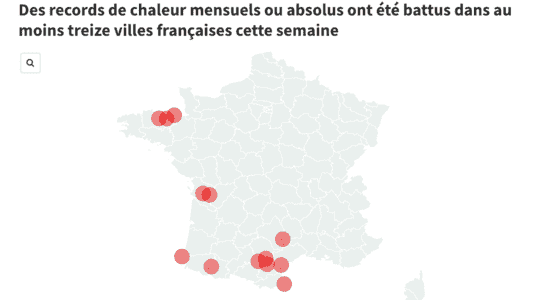France is suffocating. The country has been hit by a heat wave which has been hitting southern Europe for several days, and whose proportions are “really exceptional” both in terms of its intensity and its earliness, according to Météo-France. The mercury is expected to rise further this Saturday, reaching all-time highs, whilein Spain the firefighters try to control a giant fire.
If almost all of France is affected by the phenomenon, 11 departments are kept on red alert, with temperatures that could locally reach 43°C, explains Météo-France in its Saturday morning bulletin. They are mainly located along the Atlantic coast and in the South-West (Vendée, Deux-Sèvres, Vienne, Charente-Maritime, Charente, Gironde, Lot-et-Garonne, Landes, Gers, Pyrénées-Atlantiques and Hautes-Pyrénées). 59 departments are on orange alert this afternoon. Nearly three quarters of the French population, or 45 million people, are affected by these alert levels.
At least 13 monthly and absolute heat records broken
This is the first time that 40°C has been reached so early in France, outside Corsica (40.1°C in Ajaccio on June 14, 2019). For the moment, 13 municipalities have seen their monthly, or even absolute, heat record broken this weekend.
“Last night, many temperatures did not drop below 20 to 24°C, which is remarkable for mid-June. This afternoon, it is exceptionally hot in certain regions. 42°C in Saint-Jean-de-Luz, 41°C in Biarritz (absolute record, dating from 2003, beaten!) as well as in Arcachon, 40°C in Bordeaux, 39°C in Angers, Auch, Auxerre, Châteauroux, Niort, Mont-de-Marsan …”, underlines Météo-France in his 4 p.m. bulletin.
This Saturday afternoon, the heat continues to increase. It is generally between 37 and 41°C in Aquitaine, Poitou-Charentes, Centre-Val-de-Loire, western Burgundy and Ile-de-France. Peaks at 42° or 43°C are measured locally in southern Aquitaine. Absolute temperature records are broken. Elsewhere, in the Grand Est, the Lyon region, Auvergne, the Rhône valley and a good part of Occitania, maximum temperatures reach 35 to 39°C.
Dehydration, air pollution and the proliferation of cyanobacteria
The temperatures will slowly drop overnight from Saturday to Sunday, “the minimums will be around 20 to 25 ° C in many regions”, according to the organization, specifying that it will be necessary to remain “attentive” to possible triggers thunderstorms on the country’s Atlantic coast. The heat wave will then decrease “gradually”, to no longer concern only the eastern flank of France.
The heat wave has significant consequences on health, and in particular on those of homeless people who suffer from the dangers of dehydration. In Toulouse, the Red Cross organizes patrols to distribute fresh water to them. “There are more deaths of people in the street in summer than in winter,” says Hugues Juglair, a 67-year-old volunteer. Farmers also have to adapt. Daniel Toffaloni, farmer near Elne (Pyrénées-Orientales), “attack at daybreak until 11:30 am”. “Afterwards, I can work in the evening, before nightfall,” says this sixty-year-old. In his tomato greenhouses, the temperature can reach 55°C.
With the heat, the concentrations of ozone in the air are clearly increasing over a large part of France, according to Prev’Air, which predicts that they will remain high “in the days to come”. The Bouches-du-Rhône were thus placed on level 2 ozone pollution alert for the weekend, with a 20km/h reduction in traffic speed but without the implementation of differentiated traffic. Extreme heat also promotes the proliferation of cyanobacteria in bodies of water, leading to bans on swimming, water activities and fishing, such as at the Sesquières and Ramée lakes in Toulouse.
